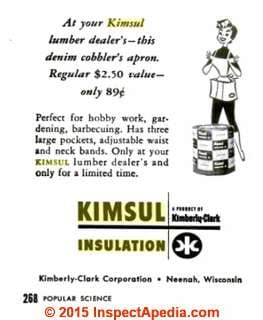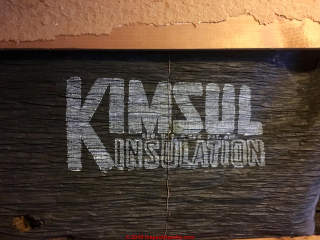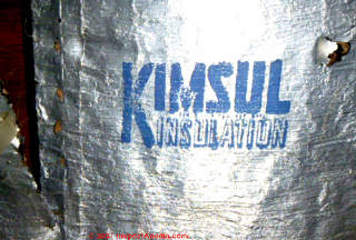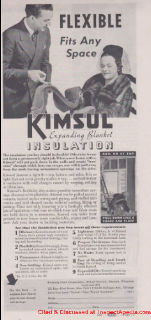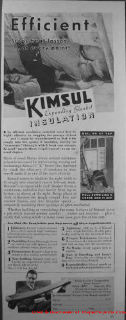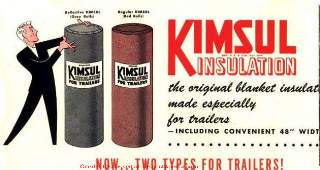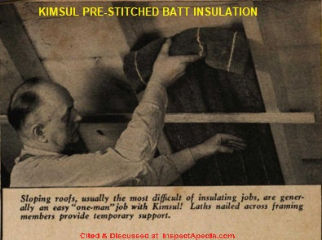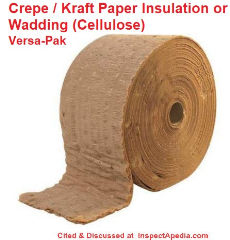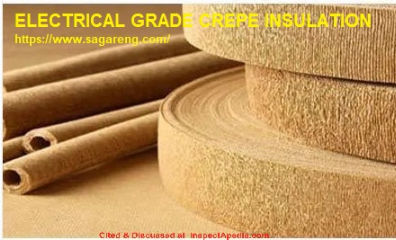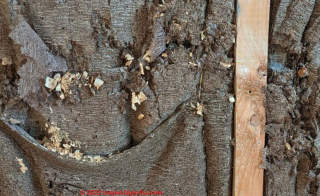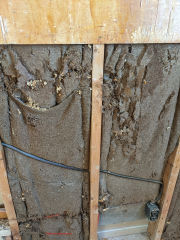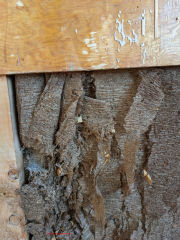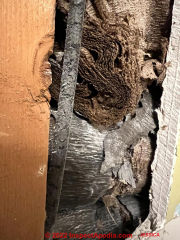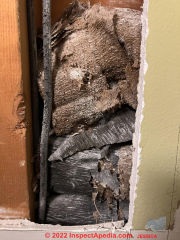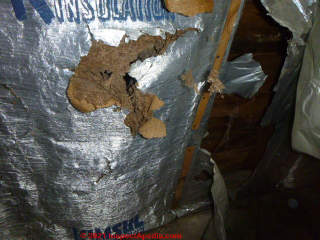 Crepe, Kraft, Kimsul Brown Paper Insulation
Crepe, Kraft, Kimsul Brown Paper Insulation
Identification, history, uses of Kimsul & similar insulating products
- POST a QUESTION or COMMENT about identification & uses of crepe or kraft paper insulation in buildings and in electrical applications
This article describes brown or tan crepe paper or kraft insulating products including Kimsul used in buildings and various modern kraft paper products used in electrical applications.
InspectAPedia tolerates no conflicts of interest. We have no relationship with advertisers, products, or services discussed at this website.
- Daniel Friedman, Publisher/Editor/Author - See WHO ARE WE?
Kimsul™ Crepe-paper-like / Kraft Paper Insulation
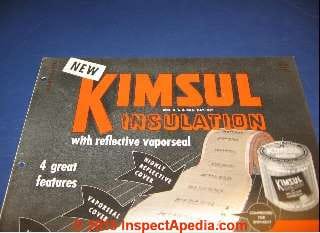 Kimsul™, produced by Kimberly Clark, in Neenah Wisconsin in the U.S., is an older insulating material used from about 1930 into at least the 1950's and that has been described by some building history sources as a creped paper insulating material that was impregnated by asphalt.
Kimsul™, produced by Kimberly Clark, in Neenah Wisconsin in the U.S., is an older insulating material used from about 1930 into at least the 1950's and that has been described by some building history sources as a creped paper insulating material that was impregnated by asphalt.
Although Kimsul was described by its manufacturer as a wood-fiber product, It won't look like the wood fiber insulation described
at BALSAM WOOL INSULATION PROPERTIES though I've seen Silvawool and "Kimsul" described together in some sources.
[Click to enlarge any image]
Kimsul, according to Bill Kibbel at historicbuildings.com, was used in refrigerators, car dashboards, in trains, and as an insulation in Quonset huts during WWII. - retrieved 2015/12/29, original source http://historicbldgs.com/asbestos.htm
It was very widely used as building insulation in North America in the 1930s through 1950s in batt and pre-stitched batt form.
Kimsul, a Kimberly-Clark insulation brand copyrighted in 1949, was sold in round rolls or in stitched batts, was still in distribution in 1956 when Kimberly-Clark advertised Kimsul for use as building insulation in the April 1956 issue of Popular Science - ad excerpt shown here.
Kimsul was also produced in reflective-faced (aluminum foil faced) batts which, if spread apart, showed what look like soft, brown, accordion-pleated crepe paper.
The company described Kimsul insulation with its reflective "vaporseal" as resisting radiant heat loss as well as providing insulation value in ceilings and walls.
The Kimsul manufacturer provided charts of percent of loss in a Kimsul-insulated wall as ranging from 0 to 90% but did not provide the R-values used today.
Typical heat loss savings estimated by the company for homes using Kimsul in walls and roofs ranged from about 25% to 38%.
A K-factor of 0.27 Btu/sq.ft. was quoted in the company's Kimsul catalog.
Kimsul's ASTM tested fire resistance was quoted in the same catalog as resisting flame temperatures as high as 1700 degF.
You may see Kimsul Insulation printed on the Kimsul insulating batts in an attic or wall of a home built in the 1940's and 1950's. Each roll of Kimsul contained 200 sq. ft. of insulating material.
The photo above, posted by InspectApedia.com reader Frank W., shows characteristic black crepe paper facing on Kimsul® insulation.
The use of stitched crepe paper facing allowed balsam wool batts of insulation to be installed easily under roofs as well as in walls and attic floors.
The Kimsul insulation shown below uses a foil facing and was observed by inspector Lawrence Transue in a Pennsylvania home built in 1940. At a tear in one of the batts you can see the balsam-wool interior.
Kimsul was also used as acoustic insulation for sound control, in theaters and in some audio speakers as an acoustic curtain, and in airplanes.
Lawrence Transue is a Pennsylvania building scientist and consultant, a certified ASHI home inspector, a Licensed Pesticide Applicator, a BPI Building Analyst & Envelope Professional, with 18 Years of Home Inspection Experience. He can be reached by Telephone: 610.417.0763, by Email: lawrence@lawrencetransue.com as well as at his WEBSITE and at FACEBOOK.
Below: 1938 advertisements for Kimsul Insulation
Below: a special version of Kimsul sold for use in insulating trailers & mobile homes.
R-Values of Kimsul Insulation
...
KIMSUL BUILDING INSULATION PROPERTIES |
||||||
| Thicknesses (Approximate) |
R-Value | Sound Absorption AV |
SqFt / Roll / Widths |
Weight /1000 SqFt |
Shipping Weight /1000 SqFt |
|
| 16" 20" 24" | 48" | |||||
| Commercial 0.5 in | 1.85 | 0.40 | 200 sqft | 500 | 68 lbs | 75 lbs |
| Standard 1 in. | 3.70 | 0.55 | 200 sqft | 500 | 120 lbs | 126 |
| Double-Thick 2-in. | 7.40 | 0.70 | 100 sqft | 250 | 225 lbs | 236 |
Notes to the table above
- Source: Kimberly Clark Kimsul TECHNICAL BOOK cited and provided in PDF form below.
Does Kimsul insulation contain asbestos?
No research to date suggests that Kimsul insulation contains asbestos.
Researching crepe insulation and Kimsul we found some folks warning that Kimsul contains asbestos.
Really? None of the product descriptions mention asbestos, though there is reference to a pyroguard fire-resistant cover that may be the source of that claim. It has not been substantiated.
I think that the confusion may stem from a too-hasty read of documents such describing the use of Kimsul in some applications where asbestos-containing materials were also present, for example:
- Culbertson, James F., SPACE HEATING with ELECTRIC RADIANT PANELS [PDF] (1949) Oregon State College, M.S. Thesis
Excerpt:
The electric radiant panels which were used in this test were made by Professor Louis Slegel, Mechanical Engineering Department, Oregon State College, for use in previous experimentation.
They were of a fabricated type, built in the following manner: a 4 by 8 foot asbestoscement board of l-inch thickness was routed with an electric saw to a depth of about 3/32 of an inch.
If a reader finds authoritative sources offering a different view on asbestos in Kimsul please use the page top or bottom link to CONTACT us.
As described in the literature cited here Kimsul is a wood-based product, basically very thin creped paper, stitched with twine, and in some applications, covered with a lamination of aluminum foil.
History & Research on Kimsul & Kraft or Crepe Paper Insulation
The Kimberly-Clark Corporation was founded on October 22, 1872 by John A. Kimberly, Charles B. Clark, Havilah Babcock and Frank C. Shattuck in Neenah, Wisconsin. The company produced a very wide range of products and among insulations, besides Kimsul, Cellucotton, an absorbent used in medicine.
- Cook, Richard K. "Behavior of acoustic materials." Journal of the Society of Motion Picture Engineers 51, no. 2 (1948): 192-202.
- Karpodines, Marco. "Controlled ambience speaker system." U.S. Patent 4,349,084, issued September 14, 1982.
Excerpt: The acoustic curtain 58 may be made of any suitable sound-absorbing material and may, for example, be made of a layer of packed fibrous cotton material approximately one inch thick similar to that used for the acoustic cover 28. In one embodiment, both the acoustic cover 28 and the acoustic curtain 58 may be made of material sold under the brand name KIMSUL™.
...
The sound projected from the speaker system can be varied by altering the type of material used for the acoustic curtain and acoustic cover, although the preferred material is sold under the brand name KIMSUL™. - Kimberly Clark KIMSUL TECHNICAL BOOK [PDF] Kimberly Clark, provides Kimsul thermal efficiency, product specifications, applications, including as sound insulation, retrieved 2022/10/27, original source: https://archive.org/details/kimberlyclarkcorporation91
Excerpts:
Kimsul is unique among building insulations and acoustical materials because it is made of many individual plies - each one a continuous separate layer of soft, clean, creped, asphalt-treated cellulose fibers. Each ply is controlled carefully in manufacture both as to thickness and crepe.
The result is a flexible blanket, inherently uniform in thickness - an important factor in thermal or sound insulating material.
The KIMSUL plies and creped PYROGUARD cover are held together with rows of strong stitching. The entire assembly is permanently resistant to fire, vermin, and mold.
To overcome the disadvantages of extreme bulk and liability to damage, common to insulating materials, KIMSUL is reduced to /5th its installed volume for shipment and storage.
Small, high-density rolls are easy to handle and resist damage.
On the job, the KIMSUL blanket is expanded in installation. Its stitching controls the expansion to the density of maximum efficiency.
Manufacture:
This modern equipment transforms cellulose fibers into asphalt-treated plies ...
Above: Pre-stitched Kimsul batt being installed under a roof - excerpted from the Kimberly-Clark Kimsul catalog cited below.
- Kimberly Clark, PRESTITCHED KIMSUL EXPANDED BLANKET INSULATION [PDF] 1940s catalog. Kimberly-Clark Corp., Est. 1872 (Kimsul Division), 8 South Michigan Ave., Chicago, IL.
Excerpt: Kimsul was developed and is manufactured by the Kimberly-Clark Corporation - of international importance for 67 years in the manufacture of wood fibre products.
Every stage in its manufacture is under the watchful scrutiny of skilled men of experience.
Modern Crepe / Kraft Paper Insulating Products
Crepe insulation, also referred to as Kraft paper insulation or kraft or crepe wadding was used as building insulation and continues to be manufactured and sold, more-likely for use in packaging, such as the Versa-Pak product shown above as
Versa-Pak™ Cellulose Wadding, Slit at 12", Perf at 12", 48" x 270', Kraft, 4/Rolls, about $400. U.S. sold at zoro.com
Description:
48" x 270' Versa-PakTM Cellulose Wadding Slit at 12" Perf at 12".
Versatile soft wadding easily wraps any shape product.
Perforated every 12" and has an additional 6" zip perf.
Multi-layer wadding absorbs oil and water.
Non-abrasive.
Can be reused or recycled.
Formerly Kimpak®.
Insulating crepe paper has also been used in some electrical wire insulation applications, such as the brown crepe paper sold in roll form and illustrated below.
Described by the company as
... Electrical Grade Insulating Crepe Paper / tubes that are used for insulation of several kind of electrical wires, Made entirely from high grade electrical Kraft base papers conforming to IEC-60554-3-5 (1984) Totally free from conductive particles, Used as insulation in Distribution/ Power/ Current/ Potential transformers.
Insulating kraft paper is also produced with an aluminum foil surface as a composite material used in transformer and other shielding applications.
- IEC 60554-3-5:1984 Specification for cellulosic papers for electrical purposes. Part 3: Specifications for individual materials. Sheet 5: Special papers, Contains the requirements for special papers which may be used for cables, transformers and conductor wrapping. - International Electrotechnical Commission.
...
Reader Comments, Questions & Answers About The Article Above
Below you will find questions and answers previously posted on this page at its page bottom reader comment box.
Reader Q&A - also see RECOMMENDED ARTICLES & FAQs
On 2022-11-04 by InspectApedia (Editor)
@CM,
Follow-up:
Zooming in on your first image I see that those small bits of "debris" look like wood-chips, not vermiculite.
On 2022-11-04 by CM
@InspectApedia (Editor),
Thanks Daniel.
We are in the middle of completely renovating this house as the previous owner did some incredibly stupid electrical and plumbing, necessitating basically all drywall to come down.
On 2022-11-04 by InspectApedia (Editor)
@CM,
I'm not sure that there's not something else present as well as on one of the sections of one of your photos I saw some little bits of debris that could have been vermiculite.
You will see complete details of this material in the article above on this page..
Some, but not all, versions of that product used asbestos in a facing paper.
Thank you for the photos and the question. They will make a nice addition to this page.
On 2022-11-04 by CM
Hi there Found this behind a wall in this older home we bought. What is it? Thanks
Below are photos of Kraft paper insulation provided by InspectAPedia.com reader Jessica who wrote:
I wondered if you might be able to help identify this. We opened up a wall and found this very fragile insulation. It’s layered and basically disintegrating when touched.
It seems to be rolled up in small sections. I haven’t been able to find anything that looks similar to it. - Jessica, 2022/10/27
Moderator reply:
Jessica, that's crepe or kraft paper building insulation. Often it was manufactured in batts that are sewn or stitched together with jute hemp thread.
Compare this kraft cellulose paper insulation with similar brown wood-based or plant-based insulations such as
and
...
Continue reading at INSULATION IDENTIFICATION GUIDE - home, or select a topic from the closely-related articles below, or see the complete ARTICLE INDEX.
Or see these
Recommended Articles
- BALSAM WOOL BATT INSULATION - older, traditional batts, paper enclosed shredded wood insulation -
- HEMP / JUTE INSULATION
- FIBER & HAIR IDENTIFICATION
- INSULATION CHOICES & PROPERTIES
- INSULATION IDENTIFICATION GUIDE - home
- INSULATION INSPECTION & IMPROVEMENT
- INSULATION R-VALUES & PROPERTIES
- KRAFT PAPER INSULATION CREPE KIMSUL
- SEAWEED INSULATION
- SHEATHING, FIBERBOARD - home - fiberboard panels used as nailbase and insulating sheathing
- WOOD FIBRE INSULATING PANELS
Suggested citation for this web page
KRAFT PAPER INSULATION CREPE KIMSUL at InspectApedia.com - online encyclopedia of building & environmental inspection, testing, diagnosis, repair, & problem prevention advice.
Or see this
INDEX to RELATED ARTICLES: ARTICLE INDEX to BUILDING INSULATION
Or use the SEARCH BOX found below to Ask a Question or Search InspectApedia
Ask a Question or Search InspectApedia
Try the search box just below, or if you prefer, post a question or comment in the Comments box below and we will respond promptly.
Search the InspectApedia website
Note: appearance of your Comment below may be delayed: if your comment contains an image, photograph, web link, or text that looks to the software as if it might be a web link, your posting will appear after it has been approved by a moderator. Apologies for the delay.
Only one image can be added per comment but you can post as many comments, and therefore images, as you like.
You will not receive a notification when a response to your question has been posted.
Please bookmark this page to make it easy for you to check back for our response.
IF above you see "Comment Form is loading comments..." then COMMENT BOX - countable.ca / bawkbox.com IS NOT WORKING.
In any case you are welcome to send an email directly to us at InspectApedia.com at editor@inspectApedia.com
We'll reply to you directly. Please help us help you by noting, in your email, the URL of the InspectApedia page where you wanted to comment.
Citations & References
In addition to any citations in the article above, a full list is available on request.
- In addition to citations & references found in this article, see the research citations given at the end of the related articles found at our suggested
CONTINUE READING or RECOMMENDED ARTICLES.
- Carson, Dunlop & Associates Ltd., 120 Carlton Street Suite 407, Toronto ON M5A 4K2. Tel: (416) 964-9415 1-800-268-7070 Email: info@carsondunlop.com. Alan Carson is a past president of ASHI, the American Society of Home Inspectors.
Thanks to Alan Carson and Bob Dunlop, for permission for InspectAPedia to use text excerpts from The HOME REFERENCE BOOK - the Encyclopedia of Homes and to use illustrations from The ILLUSTRATED HOME .
Carson Dunlop Associates provides extensive home inspection education and report writing material. In gratitude we provide links to tsome Carson Dunlop Associates products and services.


